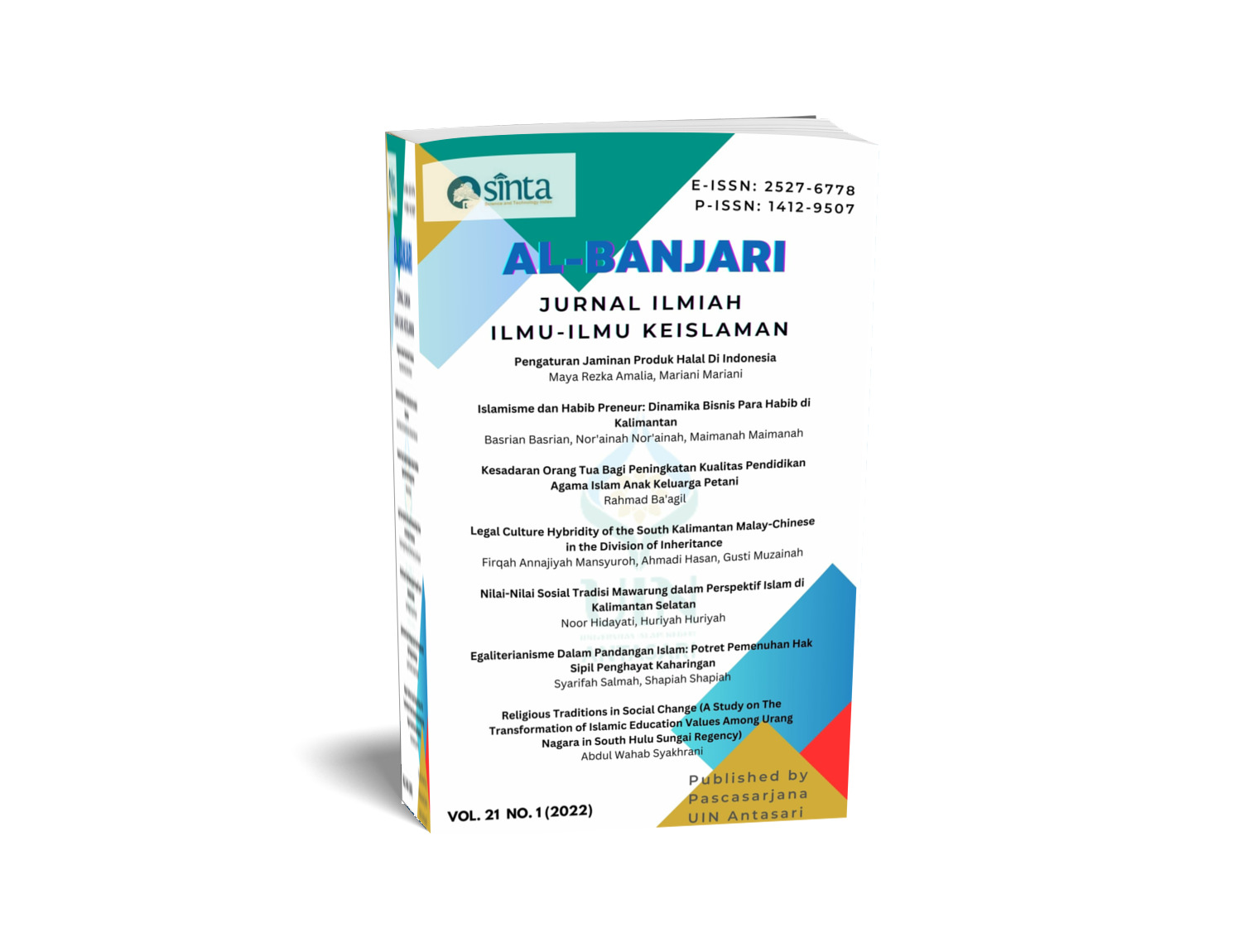Pengaturan Jaminan Produk Halal Di Indonesia
DOI:
https://doi.org/10.18592/al-banjari.v21i1.7706Keywords:
Aturan, Jaminan Produk HalalAbstract
MUI Halal Certificate is one of the requirements for obtaining permission to put a halal label on every product packaging from the government agency that has authority over it. The purpose of implementing the MUI halal certificate for all medicinal, food, cosmetic products and so on is to provide legal certainty over halal status, so that everyone can feel at ease when consuming it. Researchers utilize the type of empirical legal research that is qualitative in nature. This research is field research, strengthened by the existence of primary and secondary data sources, which are collected by researchers related to data using observation techniques. After the data is collected, it is processed through editing, categorization, and description processes. The definition contained in Law No. 33 of 2014 concerning Halah Guarantee Products is that halal products are products that have been declared halal in accordance with Islamic law. Which was then formulated in several applicable regulations including Law No. 11 of 2020 regarding Job Creation. It also contains information regarding the acceleration of regulations regarding JPH so that it can be carried out quickly and easily and becomes one of the positive implications of the ratification of Law No. 11 of 2020. Sertifikat Halal MUI adalah salah satu syarat untuk memperoleh izin untuk mencantumkan label halal di setiapkemasan produk dari lembaga pemerintah yang berkuasa atasnya. Tujuan Sertifikat halal MUI di segala produk obat-obatan, pangan, kosmetik dan lain sebagainya dilaksanakan untuk memberi kepastian hukum atas status kehalalan, agar bisa menenangkan batin bagi setiap orang saat mengonsumsinya.Peneliti memanfaatkan jenis penelitian hukum empiris yang sifatnya kualitatif. Penelitian ini yakni penelitian lapangan (field research), diperkuat adanya sumber data primer dan sekunder, yang dikumpulkan peneliti terkait data menggunakan teknik Observasi. Setelah data terkumpul lalu diolah melalui proses editing, kategorisasi, dan deskripsi. Pengertian yang terccantum dalam UU no 33 Tahun 2014 mengenai Produk Jaminan Halah adalah Produk halal adalah produk yang sudah dinyatakan kehalalannya selara akan syariat Islam. Yang kemudian dirumuskan dalam beberapa aturan yang berlaku ternasuk UU No 11 tahun 2020 terkait Cipta Kerja. Disana juga dimuat terkait percepatan aturan tentang JPH agar dapat terlaksana dengan cepat dan mudah dan menjadi salahh satu implikasi positif tentang pengesahan UU No 11 Tahun 2020 ini.References
BUKU
Ahmad Syauqi al-Fanjari.1996, Nilai Kesehatan Dalam Syari’at Islam, Bumi Aksara, Jakarta
Candra Dewi, Diana.2007, Rahasia Dibalik Makanan yang Haram,UIN-Malang.
Farid Masudi, Masdar.2010, Syarah Konstitusi UUD 1945 dalam Perspektif Islam, Jakarta: Pustaka Alvabe
Hasan, Sofyan.2014 Sertifikasi Halal dalam Hukum Positif, Regulasi dan Implementasinya di Indonesia, Yogyakarta: Aswaja Pressindo
Pryanka, A. (2020). BPJPH: Lembaga LPH. Indonesia: Khazanah Republika.
Suntana, Ija.2014, Politik Hukum Islam, Bandung: CV Pustaka Setia.
PERATURAN
UU No 33 Tahun 2014 Tentang Jaminan Produk Halal
UU No 11 Tahun 2020 Tentang Cipta Kerja
UU Nomor 18 Tahun 2012 tentang Pangan
UU Nomor 36 Tahun 2009 tentang Kesehatan
UU Nomor 8 Tahun 1999 tentang Perlindungan Konsumen
PP Nomor 69 Tahun 1999 tentang Label dan Iklan Pangan
Instruksi Presiden (Inpres) Tahun 1991 tentang Peningkatan Pembinaan dan Pengawasan Produksi dan Peredaran Makanan Olahan
Keputusan Menteri dan Keputusan Bersama Menteri
JURNAL
May Lim Charity, Jaminan Produk Halal di Indonesia (Halal Product Guarantee in Indonesia) Perundang-undangan Kementerian Hukum dan HAM [email protected]
Mutiara Fajrin Maulidya Mohammad, Pengaturan Sertifikasi Jaminan Produk Halal Di Indonesia Fakultas Hukum, Universitas Airlangga, Surabaya-Indonesia [email protected]
Downloads
Published
Issue
Section
License
Copyright (c) 2022 Al-Banjari : Jurnal Ilmiah Ilmu-Ilmu Keislaman

This work is licensed under a Creative Commons Attribution-ShareAlike 4.0 International License.
Authors who publish with this journal agree to the following terms:
- Authors retain copyright and grant the journal right of first publication with the work simultaneously licensed under a Creative Commons Attribution License that allows others to share the work with an acknowledgement of the work's authorship and initial publication in this journal.
- Authors are able to enter into separate, additional contractual arrangements for the non-exclusive distribution of the journal's published version of the work (e.g., post it to an institutional repository or publish it in a book), with an acknowledgement of its initial publication in this journal.
- Authors are permitted and encouraged to post their work online (e.g., in institutional repositories or on their website) prior to and during the submission process, as it can lead to productive exchanges, as well as earlier and greater citation of published work (See The Effect of Open Access).


































